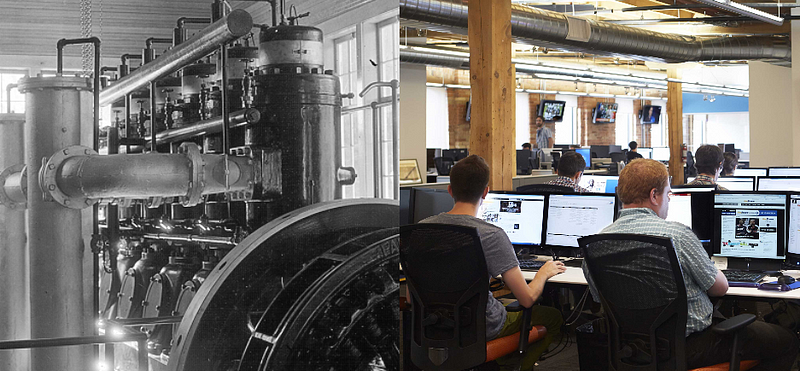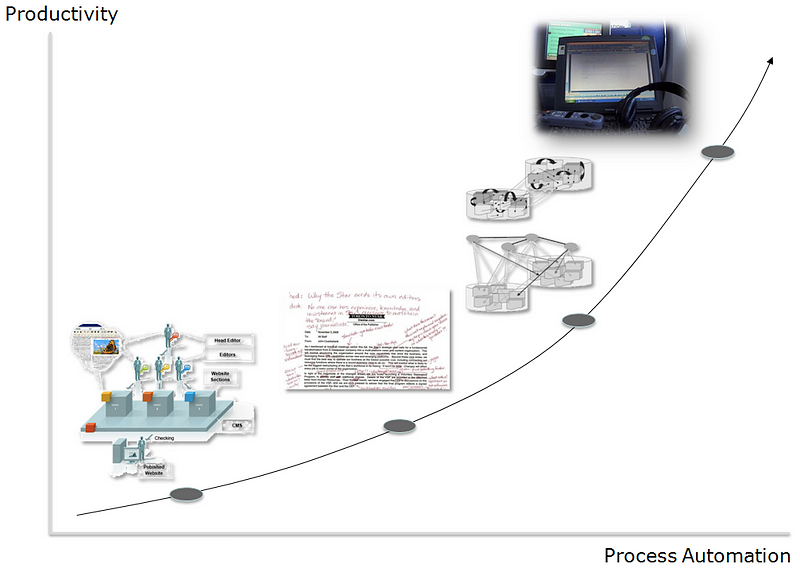
Are Machines Stealing Your Job?
3 myths about the impact of AI on content creators
Industrialization is transforming our information economy, destroying old business models and creating new opportunities. The impact on content professionals will make social media seem tame in comparison. To understand this transformation and leverage it to your advantage, you need to parse the myths from reality.
I’ve argued that industrialization is the most transformative force on the internet. Human tasks are rapidly being displaced by machines. Factories of advanced technologies are being constructed to automate the manufacture of information and content. Predictably, there is much hand-wringing and righteous indignation expressed about this economic sea change.
The concerns are real. Industrialism affects lives. Jobs are being lost and venerable institutions are being eradicated. Unfortunately, gauging by the reaction in social media, and through my own travels venturing in this area, we’re awash in misconceptions and half-truths about this disruptive force.
Myth #1: Industrialism is about automating jobs
Criticisms of industrialism can largely be boiled down to one main indictment: machines destroy jobs. They marginalize skilled professionals and subjugate their roles.
While there is some truth in this criticism, it is also superficial and misleading. There is a naïve view of a “sweatshop” migration, where formerly highly paid professionals end up toiling away at a pauper’s wage creating the drivel that their AI overlords assign to them.
The reality is far more nuanced. Technologists are not automating whole jobs or professions, but rather discrete tasks.
Technologists are not automating whole jobs or professions, but rather discrete tasks.
For example, consider the process of content creation using an industrial perspective. It’s an extremely complicated process that involves a large number of highly specialized tasks: workflow management, technical infrastructure, editorial and creative direction, content aggregation, layout, information architecture, and many others. As these tasks are automated, fewer people need to be involved in the process. Costs decrease and new economies of scale are realized.

Forward-looking professionals adapt to technology opportunistically. They evolve new roles that incorporate these tools. Consider the positive impact of technology on investigative journalism or the rise of data journalism.
Myth #2: Internet industrialism is about the future
Some take comfort in AI as science fiction, far removed from our current economy.
In reality, the drive towards these productivity advantages is relentlessand in full force, right now. Billions are flowing into the industrialized internet. Giants like Google, Facebook, and Amazon have already emerged. A large number of well-financed and industrious start-ups are rushing in to fill needs for specialized machinery. All are leveraging the programmable web to drive this industrial revolution forward.
The drive towards these productivity advantages is relentless and in full force, right now.
Denying this present economic reality, or imagining that concurrent social revolutions will displace this economic drive towards productivity, would be a risky non-response.
Myth #3: AI only creates spam
Content professionals take pride in the quality of their hand-crafted content. They imagine machines will only create spam, polluting the internet with a glut of low-quality content that consumers will reject in droves.
It’s painful to watch critics of industrialism pulling out their quality knives in this quantity gun fight. While artisans decry the death of professional content, the industrialists quietly find markets where the quality of their content is valued as “good enough”.
Industrialists quietly find markets where the quality of their content is valued as “good enough”.
There are no absolute measures of quality. It needs to be assessed in the context of our insatiable demand for information. People value content that makes their tasks simpler and more convenient; content that is evermore customized to their needs. Assessments of quality need to reconcile these fast-changing dynamics of supply and demand.
Is there room for abuse? Of course. We struggle with machine-generated spam just as surely as we struggle with spam in all its existing forms. But quality, as an argument against industrial productivity, is a misdirection you’ll want to avoid.
Are machines stealing your job?
The answer is a resounding no. Jobs and professions are more than collections of tasks. But the machine-builders are gunning for formulaic and repetitive tasks that lend themselves to automation.
Machine-builders are gunning for formulaic and repetitive tasks that lend themselves to automation.
If you wear routine tasks like comfortable old shoes, your job will be overrun. If you embrace these technologies as just another tool in your professional toolbox, you’ll run these next-generation factories.
